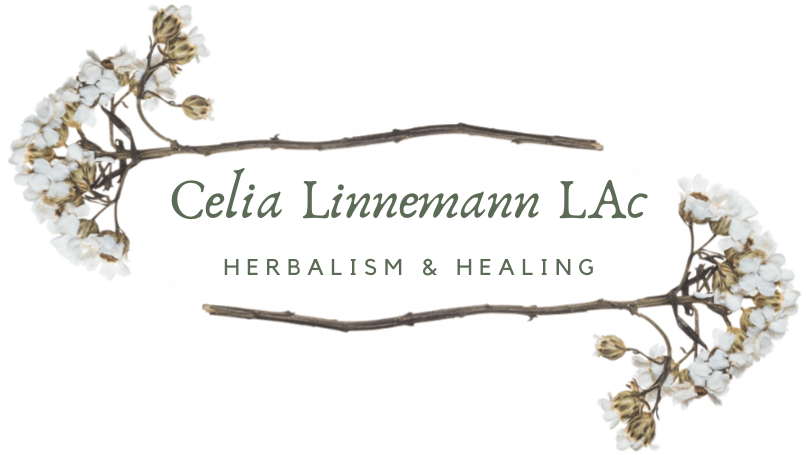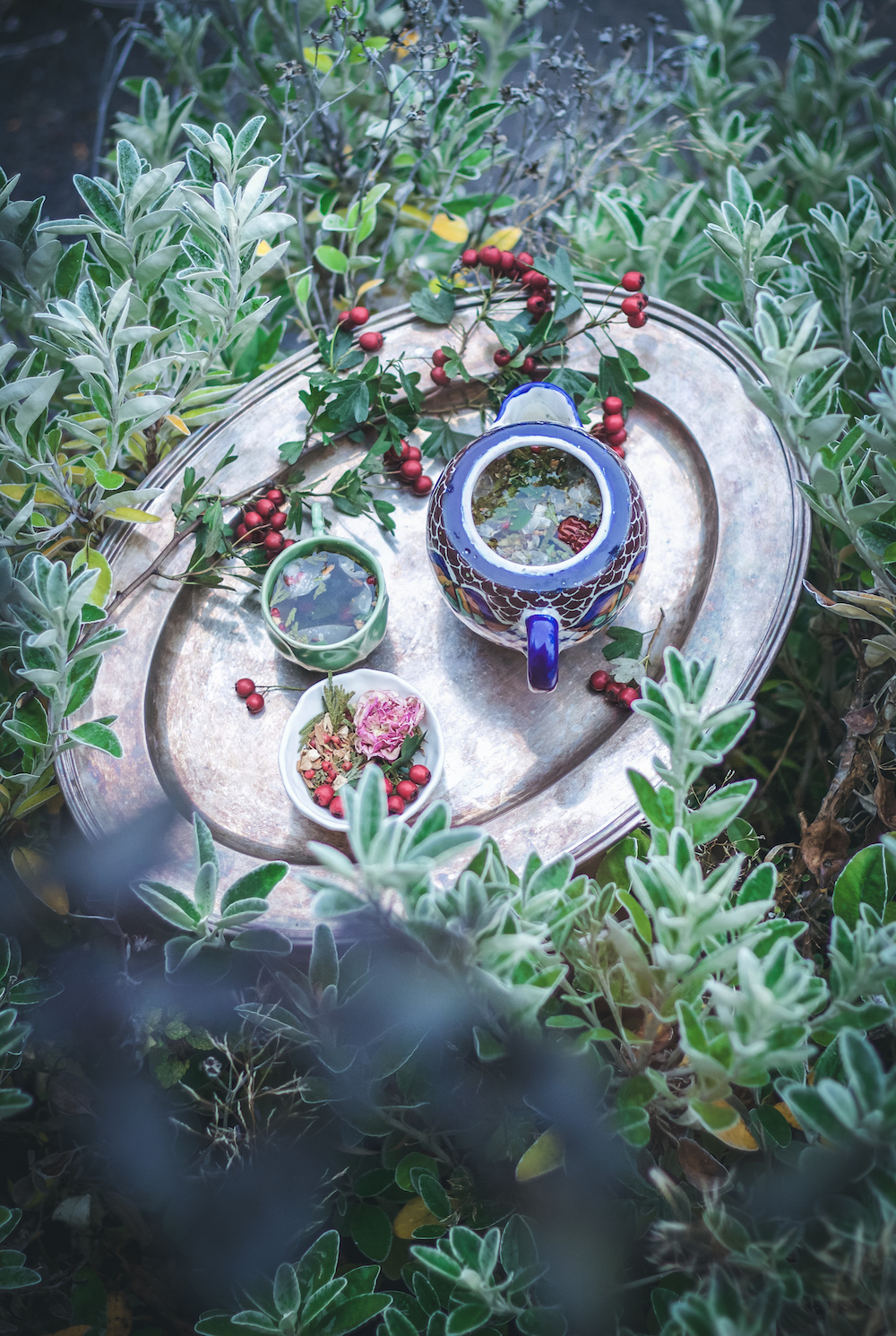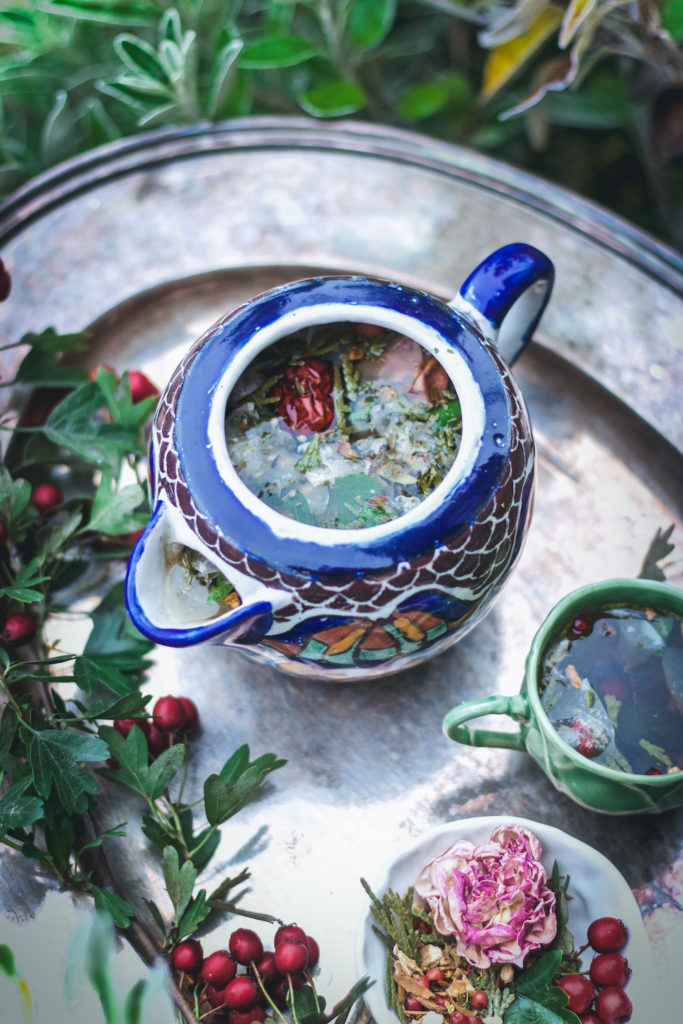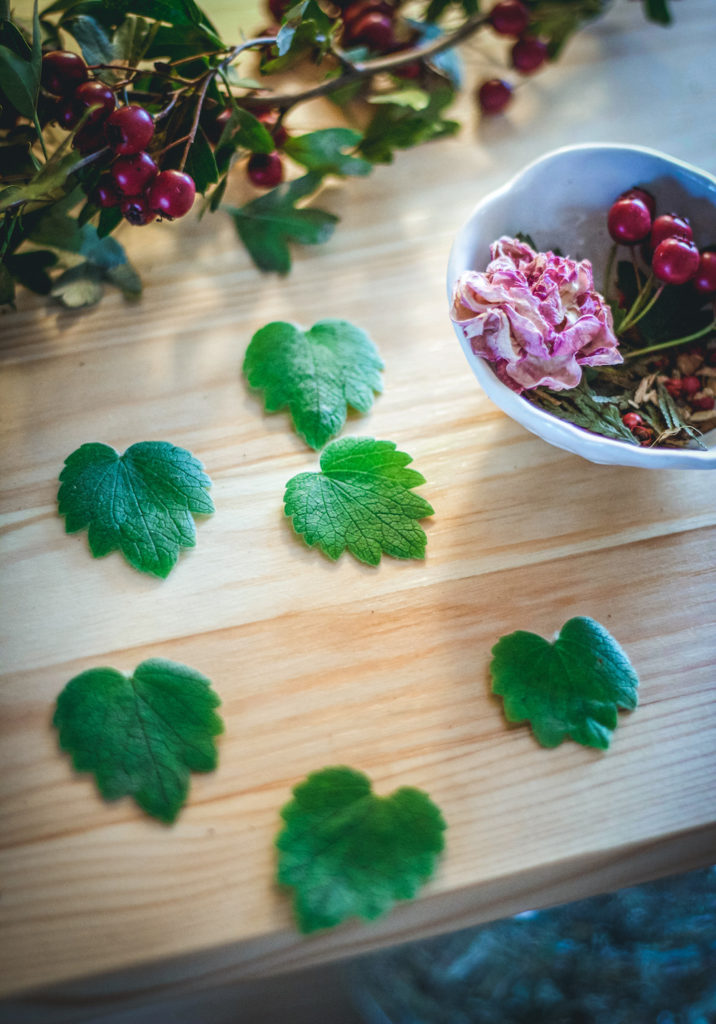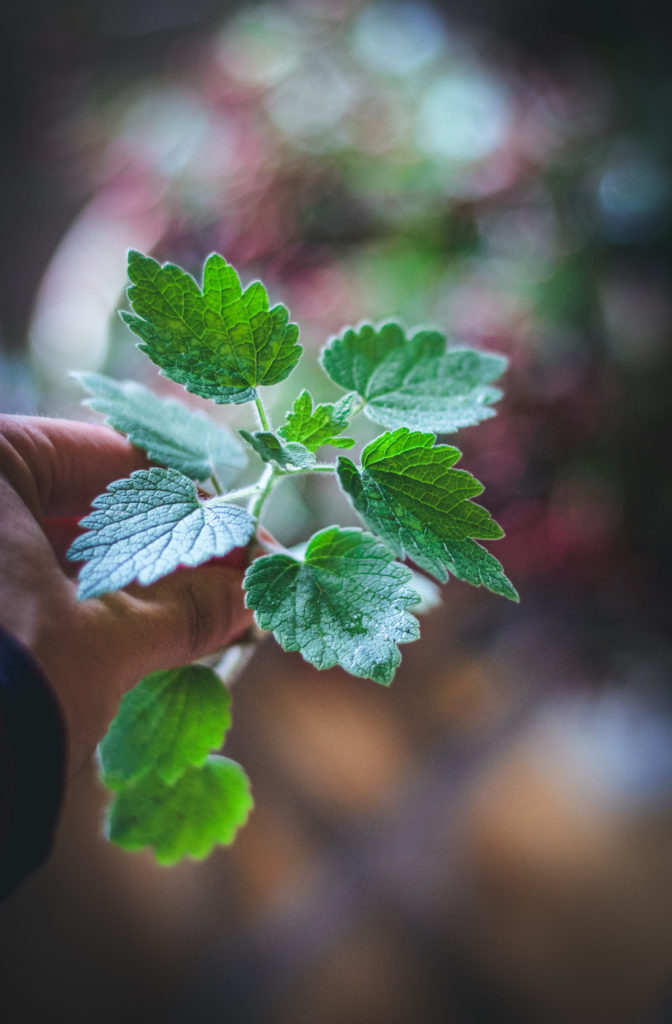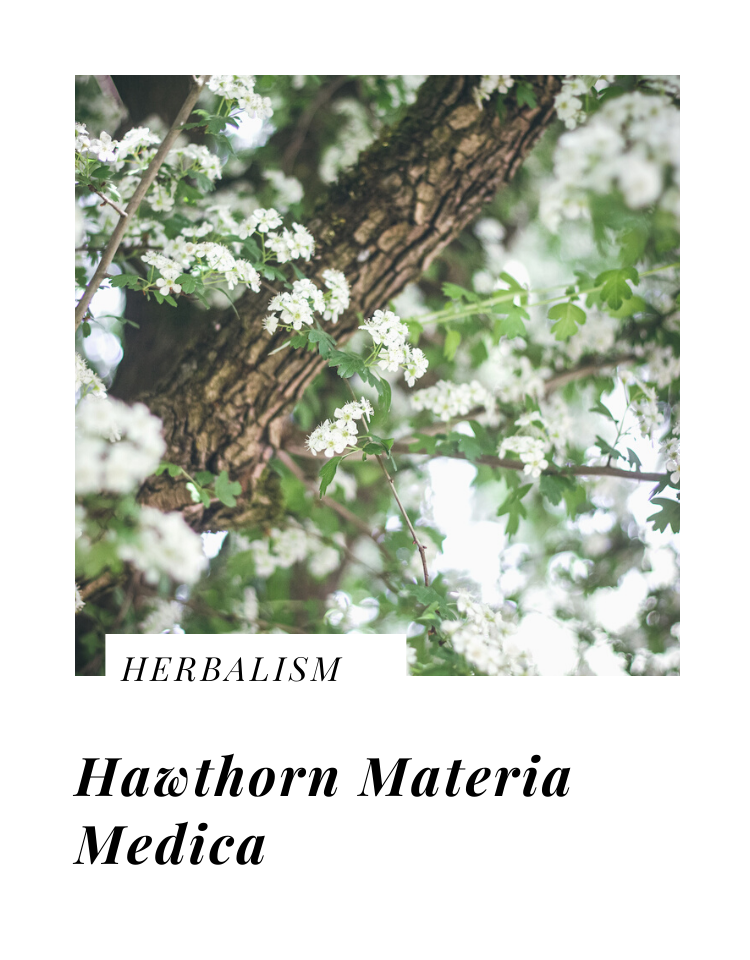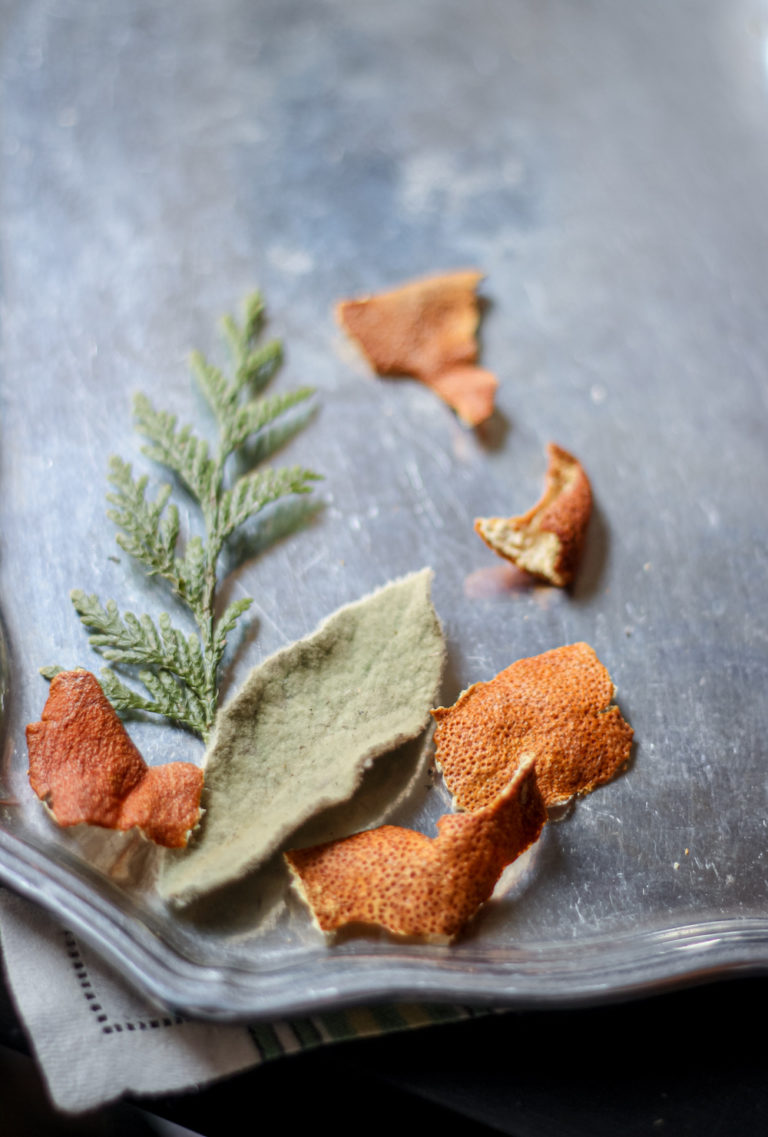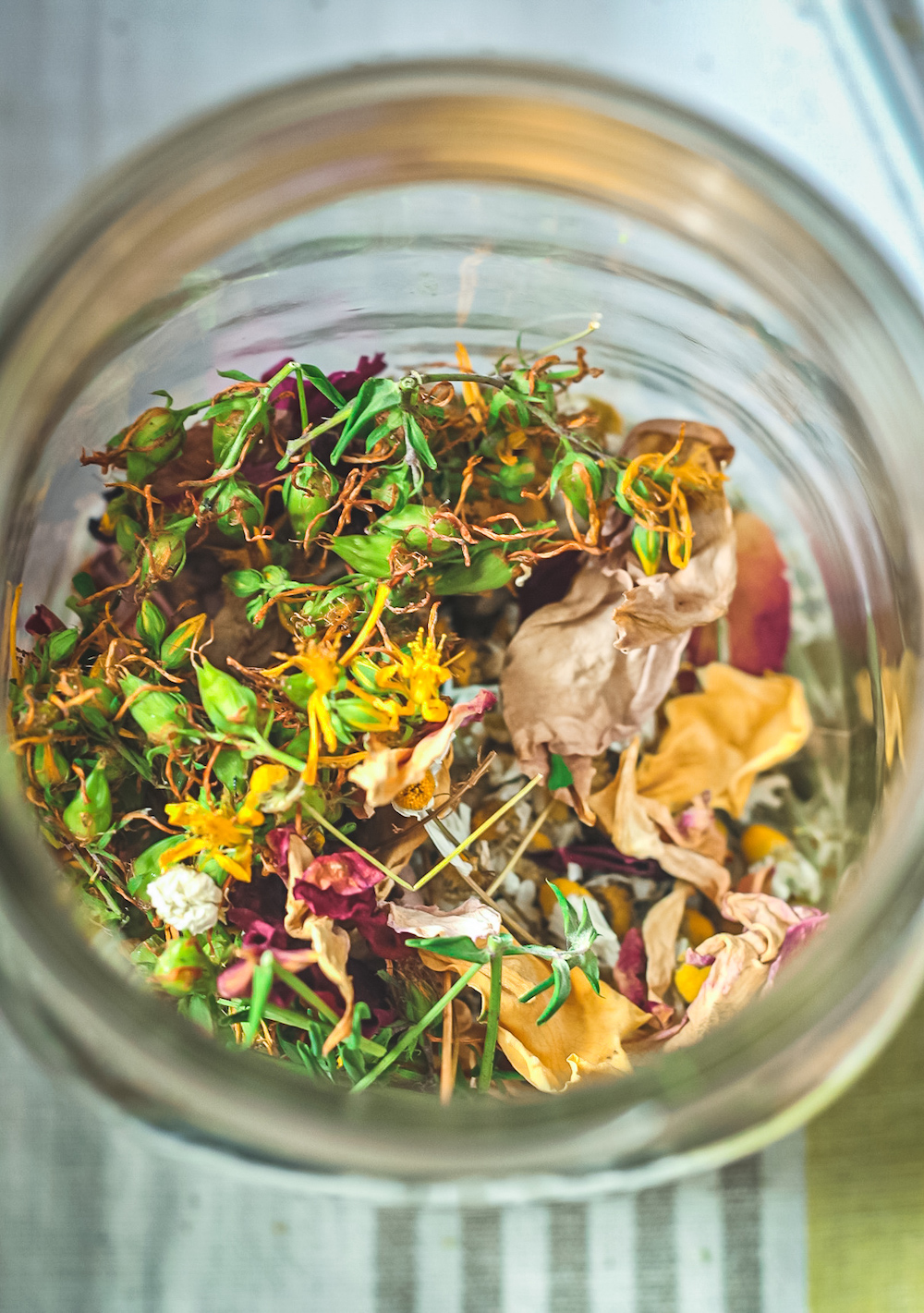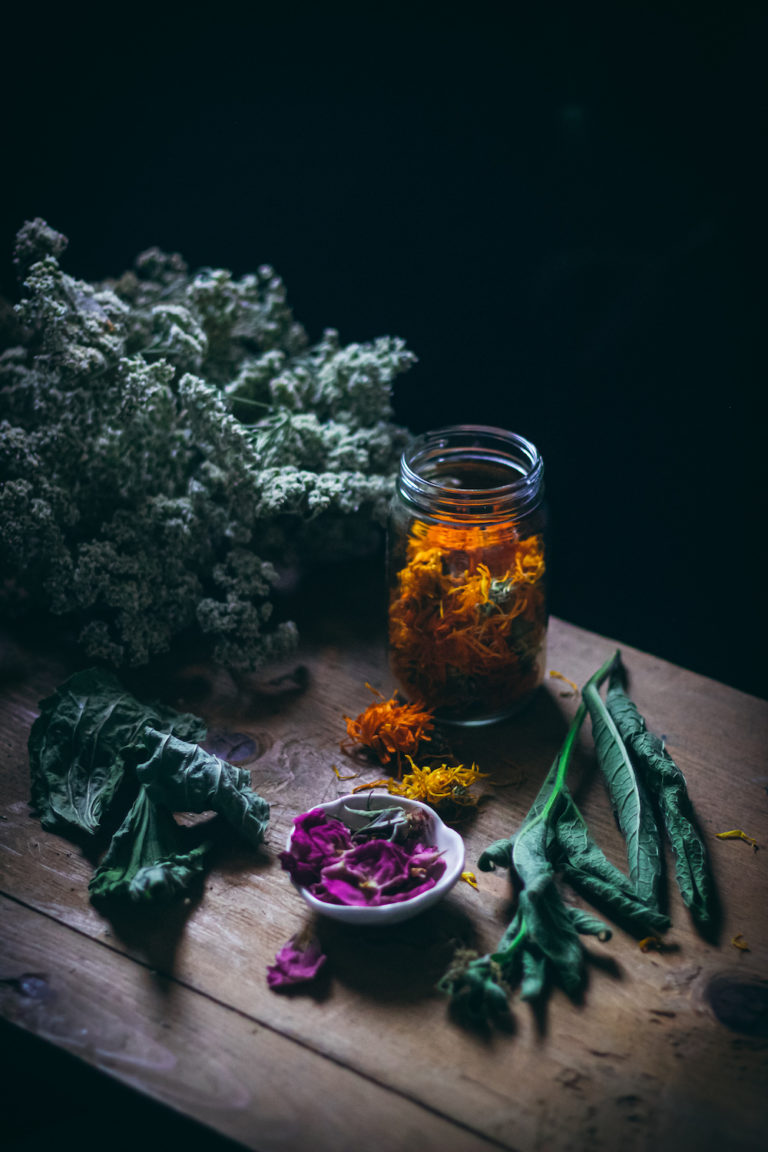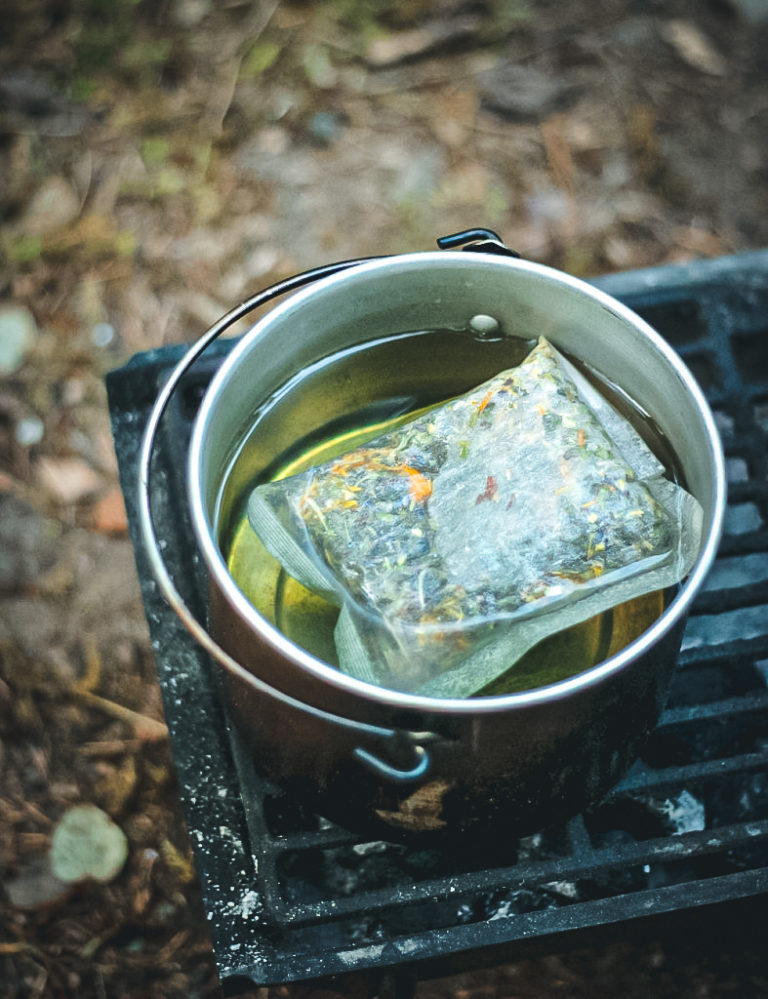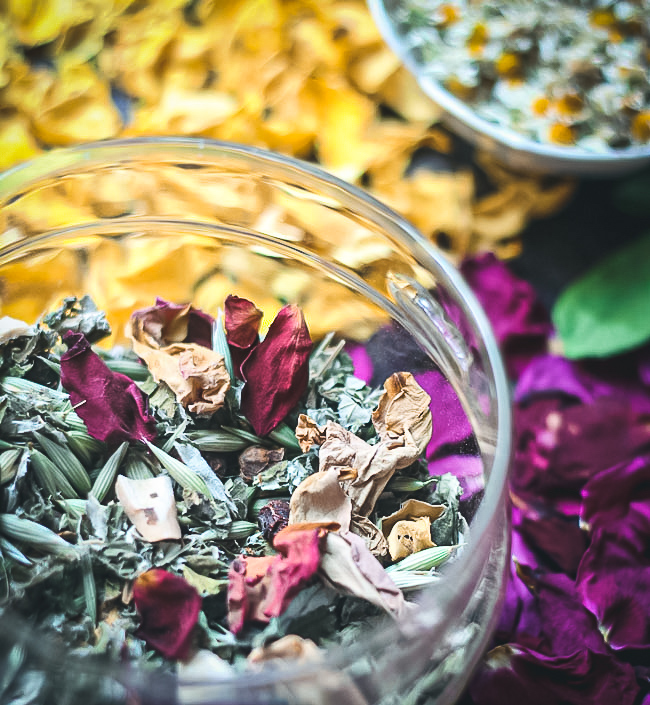I’d really rather not have anxiety right now: Hawthorn and Motherwort Tea
It’s fall and that means it is time to harvest one of my most beloved herbs for A) healing on all levels of our being and B) flavor, color and tea blending: Hawthorn berries. I want to share this Hawthorn and Motherwort tea I’ve been sipping as an inspiration for your own Hawthorn tea blending.
Hawthorn and Motherwort are two of my personal favorite herbs for anxiety and palpitations.
There are many, many ways to address both anxiety and palpitations.
Hawthorn and Motherwort tea are one such way, but definitely NOT the only way. Try what you are drawn to and feel safe about, but please know that there are many paths towards feeling better regarding anxiety and palpitations, and yours might look different.
Chest-Centered Anxiety and/or Palpitations
I find that Hawthorn and Motherwort work well together for chest-centered anxiety with flight or flight type symptoms. This could include palpitations, or the sensation or awareness of the heart beating uncomfortable in the chest. This tea helpful for palpitations without anxiety.
NOTE* Consider consulting with a medical practitioner any time it feels as if the heart is functioning abnormally.
This is the type of anxiety is related to a tight, constricted sensation in the chest, specifically around the middle of the sternum. Although it could also be a vague, overall ache without a specific location.
I do not think Hawthorn work as well for generalized anxiety (GAD) in the short term.
I have been pleasantly surprised a couple times when a few cups of this tea over a few days has helped those with persistent, long term GAD, but for most people it will not turn it around so quickly.
Generally, though, for GAD other herbs, modalities and therapies may be needed to create a holistic approach to support the healing of a long-term state.
Someday I’d like to dedicate a blog entry to generalized as well as acute anxiety, but in the meantime, if you are interested here are a couple of links to some info about anxiety from a Chinese medicine perspective:
Fear and Anxiety – A Chinese Medicine Perspective
…and a study
Important: For best results, drink a strong tea, frequently
Dosing is important for addressing palpitations and acute anxiety.
The tea recipe below has general “pinch or two” type of measurements. That is great for a connecting to your self and your body type of tea.
If you want to specifically address anxiety and/or palpitations, use medicinal doses that are stronger.
For a 2 cup pint jar, use 2-4 heaping tablespoons of both Motherwort and Hawthorn. That can be a combo of Hawthorn berries and the leaves/flowers, or just one.
Drink 3-4 pints a day.
I do not strain my tea. I keep drinking from the same jar, adding more boiling water. So even though it is a strong tea I continue to drink from the same herbs, getting a lot of medicine out of it over time.
Of course, you can strain your tea! But feel free to save the herbs and re-steep them again. After 3-4 re-steeps I make a new batch.
Use several doses in a row
I suggest drinking 3-4 pints of tea per day for a minimum of 2 days, ideally 3 days.
This is where I see the best results for many medical applications of teas (tinctures or other therapies, too), anxiety and palpitations included.
You may feel better after one pint of tea, but I truly find that to have lasting change, a few cups for a few days is the most transformational.
There seems to be a lot of lasting change after 3 days of medicinal application. Part of it is that the body, brain and specifically neurology need a little bit of time to break out of a route of expression. I see this very much for pain, inflammation, insomnia and anxiety too.
Continue to nourish and soothe with herbs (or tinctures, epsom salts, pro-biotics or whatever – could even be meditation, deep breathing, acupressure, body work or physical therapy) for around 3 days to see best results.
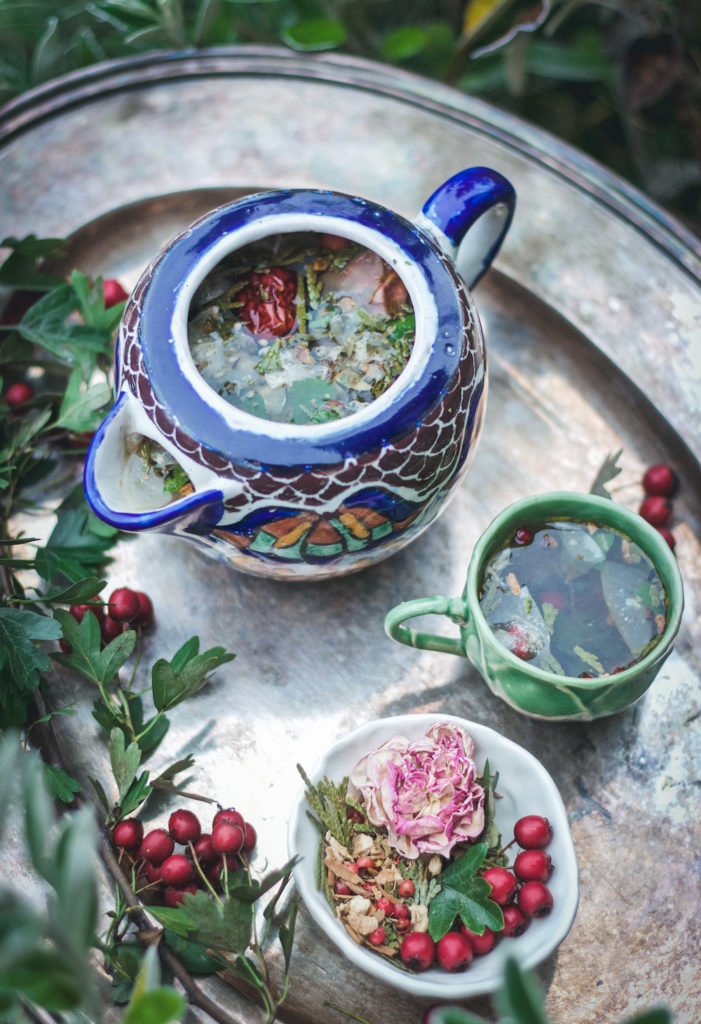
My own Lyme-related chest-centered anxiety
In the early months when I was working on eradicating the Lyme co-infections of Babesia, Bartonella and Mycoplasma, I had a lot of strange symptoms and a lot of nerve involvement.
Once I had a number of weeks where a nerve from my upper thoracic spine was impeded as it wrapped around to my heart and lungs. I also had Vagus nerve dysfunction…and I was having a lot of Mycoplasma troubles, which infects the lungs.
All of these factors added up to my heart and chest having really erratic and dysfunctional nerve impulses, and I had a lot of palpitations, chest tightness and intense, intense anxiety because my lungs and heart were not getting the nervous input they needed to feel safe.
It was as if my nerves were inducing a constant state of fight or flight, and it got worse each day and week.
At first I was so confused and shocked by what I was feeling that I didn’t know what to think. My body was in a state of panic, no wonder I couldn’t think.
After a while, I was somehow able to gain more clarity about what was happening and what I could do about it.
I drank a LOT of Motherwort and Hawthorn tea, which usually does the trick for anxiety and palpitations for me quickly.
But this time, my body was much more stubborn, perhaps because of the anatomical, nerve irritation nature of the anxiety.
That was when I got to see how continual strong cups of Motherwort and Hawthorn over a number of days and then weeks helped to chip away at the level of anxiety and frequency of palpitations slowly but steadily.
Since then I have had a few opportunities to share Motherwort Hawthorn tea for people with more long-standing anxiety and or palpitations, and for them the repeated strong cups of tea over 3 days or so is also a good strategy.
Motherwort and Hawthorn tea are not just for acute anxiety
I used “anxiety” in the title of this post because these two herbs are indeed a valuable tool for anxiety and/or palpitations, but it is not the only reason to use this tea.
In fact, I use these two for tea all the time.
Like any two herbs, Hawthorn and Motherwort are individual herbs, with differing actions and natures. But yet they overlap in that both herbs are relaxing nervines with a Heart and Blood affinity.
Both Hawthorn and Motherwort bring us into the body, into the heart center, into our core.
Motherwort in grounding and supportive as they reenforces the inherent connection between the Heart and the Uterus-Lower abdomen.
Hawthorn holds the Brain-Heart connection, and because of its heavy round seed nature, plants that coherence into the gut and helps us ‘digest’ and ‘metabolize’ in order to gain clarity.
They help facilitating our feeling into our tissues, emotions and into our self.
These softening and calming herbs are so very useful in connecting with ourselves because it can be challenging or downright scary or re-traumatizing to touch base with our bodies as they can hold imprints and memories from woundings or harm.
I believe they do this on many levels, including toning and regulating the Vagus nerve, increasing blood flow to the heart muscle while dilating the vasculature, to fill the heart and contribute to a state of rejuvenative homeostasis…it’s like coming home to a new set point in the center of yourself.
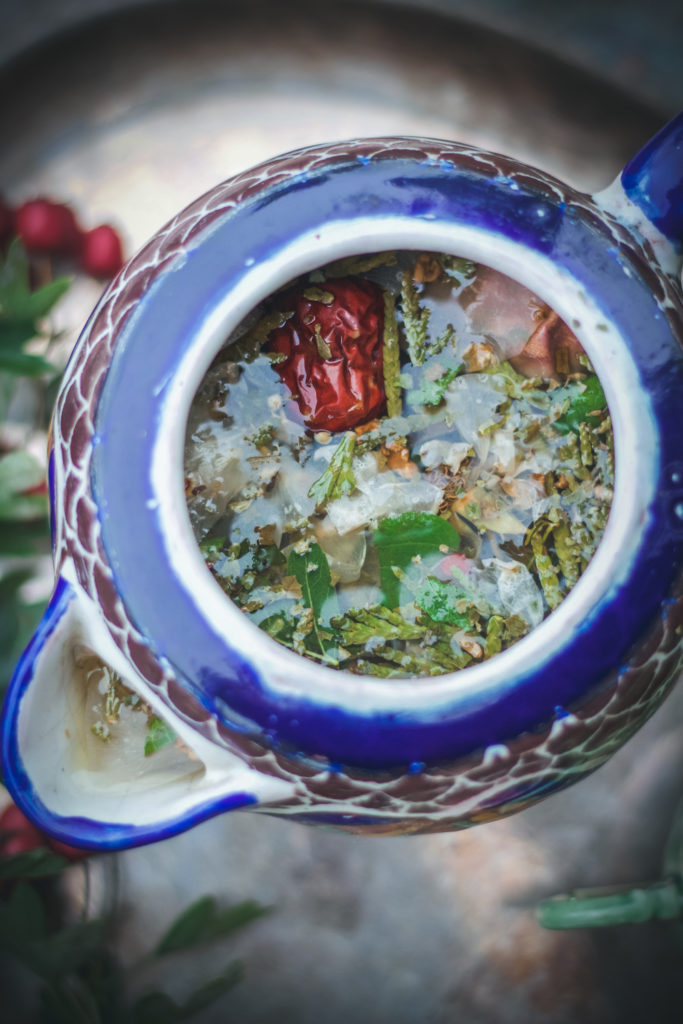
Lead with the Heart – Hawthorn, Motherwort and Rose Tea
- Hawthorn leaves, flowers and berries
- Motherwort
- Rose
- Da Zao – Jujube date
- Western Red Cedar tips
- Cinnamon
- Licorice
- Ginger
- Pink Peppercorn
Directions:
Mix a pinch or two of everything – though less of the warming spices.
Steep tea. Strain – if you want. Drink, enjoy.
Re-steep: I find Hawthorn berries get better the more then are steeped.
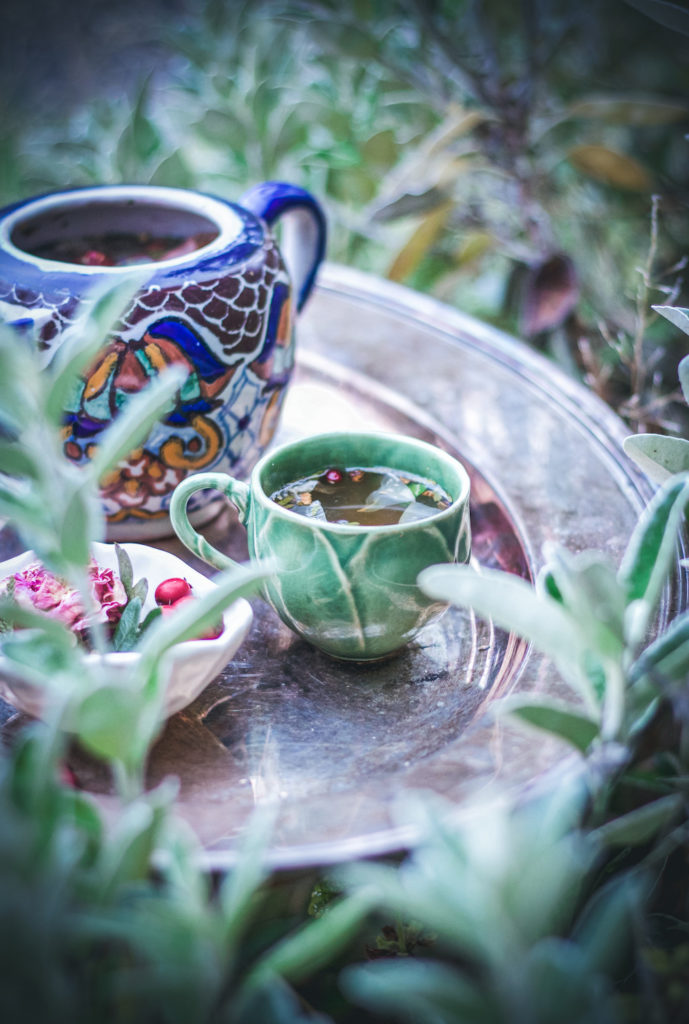
About this Hawthorn and Motherwort Tea
I love Hawthorn for tea blending. As a berry, they impart an overall centering and harmonizing quality to a formula.
Hawthorn berries are sweet and sour, nourishing and balancing the blood and heart. I also added Hawthorn flowers and leaves, too, to center the tea around its heart-opening actions.
Hawthorn brings me into the chest, into the heart itself, then it opens the circulation. I find it to taste a little cool, but in the body it opens up circulation and helps me feel warm from my head to toes.
Hawthorn is no doubt one of my favorite herbs for addressing the heart, such as for palpitations, circulation, and digestion.
An Eclectic specific indication for Hawthorn was fatigue from overwork, particularly in younger people, or in older people who are working as if they are young (all of this is on this Hawthorn Materia Medica post).
On the mental-emotional realm, I find Hawthorn useful for improving focus, when the mind feels cloudy and unsure, as well as for holding space for confidence, self-esteem and self-worth.
Hawthorn returns us to our heart, and it helps return us to our hearts, like in the case of soul loss and therapeutic soul retrieval and integration.
Finely Ellingwood wrote of Hawthorn in 1918: It dispels gloomy forebodings, increases the strength, regulates the action of the heart, causes a general sense of well being.
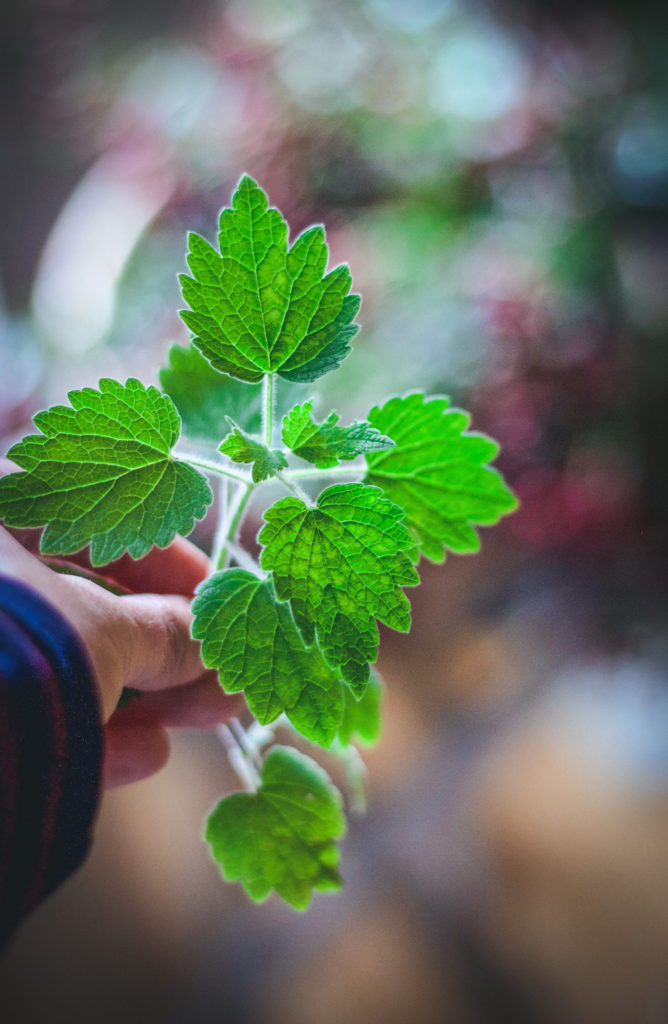
Motherwort is a bitter mint. It too is a heart-opener, but it also supports digestion through moving the Liver and as a bitter.
*Motherwort is an emmenagogue; avoid during pregnancy. I swap out Motherwort for Linden during pregnancy.
Motherwort is grounding as it enters the womb-space, or the Lower Jiao for those without uteruses. To me, Motherwort helps unblock stuck-ness in the heart, and it helps to organize scattered-ness and soften hardness, especially when I am moody, crabby or upset in ways that annoy myself
Sometimes I get crabby and it is very useful and therapeutic. Sometimes I just need to identify with what angers me, or maybe I need to vent.
Motherwort can help with that crabby, venting period is not serving me, like if I am looping my criticism obsessively. Or it’s 1am and I really need to go to sleep, not be ruminating about what pisses me off.
One of my favorite actions of Motherwort is that it makes me giggly as it clears out the crabbiness. Motherwort helps me laugh it off, which can be quite helpful because laughter is a great mover of Liver Qi.
Hawthorn and Motherwort are one of those divine herbal pairs. They both work on the heart so well, and are both energetically protective and nourishing. They combine in a tea blend I call “Day 1” with added Bai Shao or White Peony and Yarrow for menstruation, for the Blood and for the Womb-Heart connection.
Together, Hawthorn and Motherwort help with opening and flowing; uplifting and centering.
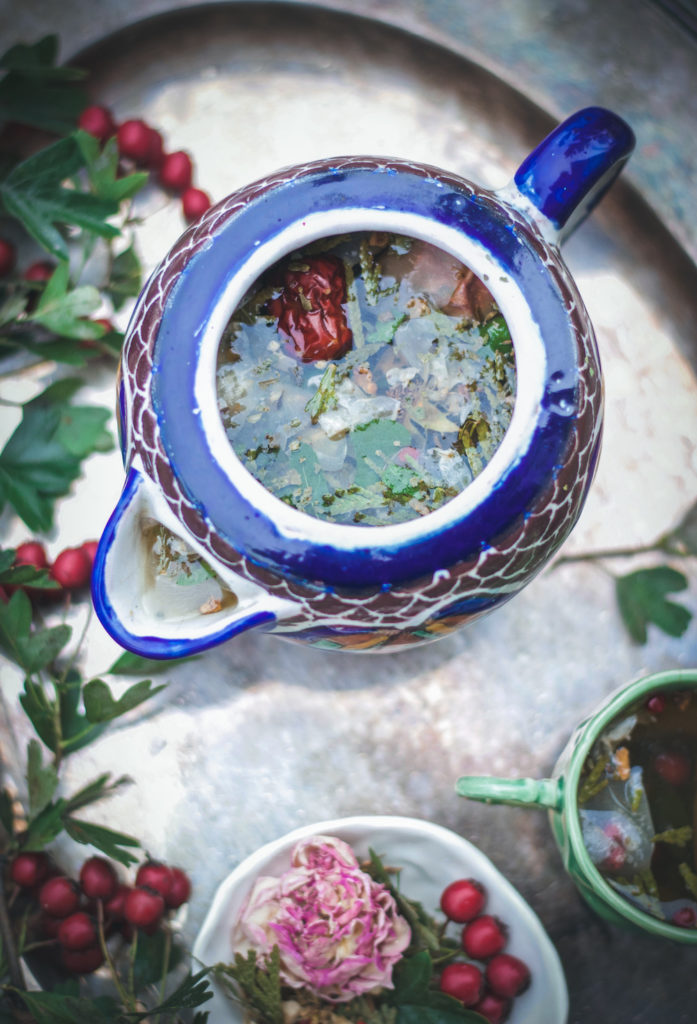
Supporting Herbs
Now that we have established how lovely Motherwort and Hawthorn are together when working with the heart, let’s talk a little about other herbs in this formula.
pssst… Rose and Cedar are in this post about a mentally uplifting tea blend, and how to use roots and hard herb parts to hold space in an infusion.
Rose is added for flavor and to accentuate the heart-centered qualities. I find it to be a bit more cooling than Hawthorn, even though they are in the same family and overlap some of the same types of anti-inflammatory constituents and pigments.
Rose is a cooling, sweet and floral herb that opens and fills the heart spreading joy and love.
I know that can sound silly, like can a plant really fill your heart with love and joy?
Well, have you ever walked through a rose garden with a lazy smile on your fave, your eyes dreamily glazed over from all the beauty around you, feeling uplifted and calm at the same time?
And then you stick your nose in a rose to smell the fragrant aroma and feel floating in time and space? That’s what I am talking about.
Rose gently moves stagnant Liver Qi, calms the nervous system and quells hot and inflamed states in the emotional or physical body.
Da Zao or the jujube date is a Chinese herb. It is a sweet nutritive herb that enters the Heart and Spleen, and I thought it would further support the actions of Hawthorn.
Western Red Cedar was added for its fresh invigoration flavor and green beauty – although it is a medicinal herb all of its own.
I was drawn to it as a local herb that helps me feel anchored into the place where I live. In this way it can support coming home to ones heart.
*Thuja or Cedar can be irritating and potentially toxic for those with kidney compromise or diseases impacting the kidneys. People who are pregnant or nursing should avoid it as well. All of us should avoid large doses of Thuja (like don’t take a bath in a huge vat of it or drink quarts of it or use it daily for months).
This tea is flavored with sweet, warming and spicy herbs Cinnamon Licorice, Ginger and Pink Peppercorns.
Happy tea blending with Hawthorn and Motherwort.
Wishing you the best,
Celia
PS… This post was inspired by two other Hawthorn posts.
One about the energetic, magical and spiritual properties of Hawthorn, and another about the brief history and use of Hawthorn in physical medicine (including my own personal Hawthorn Materia Medica).
